Omega-3 Fatty Acids and Body Image Disorders: Supporting Emotional Health
Introduction
Body image disorders such as Body Dysmorphic Disorder (BDD) and eating disorders are deeply rooted in emotional distress, obsessive thought patterns, and neurochemical imbalances. While therapy and mindfulness are vital for healing, nutritional support—especially from omega-3 fatty acids—plays an underestimated role in emotional regulation and brain health.
In this article, we’ll explore how omega-3s influence the brain chemistry underlying body image issues, their connection to mood and self-perception, and how combining them with therapy and self-regulating practices can create a powerful foundation for recovery.
Looking for supplements for This? Click here.
Understanding Body Image Disorders: When the Mind Turns Against the Self 🪞
Body image disorders aren’t simply about vanity or self-consciousness—they’re conditions where perception, emotion, and biology intertwine. Individuals with BDD or disordered eating often experience distorted self-images that persist even when others see no flaw. This distortion is fueled by brain regions involved in visual processing, reward, and emotional regulation.
Research shows abnormalities in serotonin and dopamine signaling in those with body image disorders. These neurotransmitters influence how we interpret ourselves, regulate mood, and respond to social feedback. When the brain’s chemistry is imbalanced, self-criticism becomes louder, and emotional regulation weaker.
Omega-3 fatty acids—especially EPA (eicosapentaenoic acid) and DHA (docosahexaenoic acid)—play crucial roles in these exact neurochemical processes. Their anti-inflammatory and neuroprotective properties make them essential allies in restoring emotional balance and brain function.
The Brain-Body Connection: Inflammation, Mood, and Self-Perception 🌊
Chronic inflammation doesn’t only affect the body—it impacts the brain. Inflammation can alter neurotransmitter signaling and promote oxidative stress in neural tissue, both of which contribute to anxiety, depression, and emotional instability. These emotional symptoms often underlie body image disorders.
Omega-3 fatty acids have potent anti-inflammatory effects that help modulate the production of cytokines—chemical messengers that can influence brain mood circuits. Studies have found that low omega-3 intake correlates with higher rates of anxiety, obsessive-compulsive behavior, and depressive symptoms—all commonly seen in BDD and body image disorders.
By reducing inflammation and supporting neural repair, omega-3s indirectly promote clearer thinking, fewer emotional outbursts, and a more stable mood—key foundations for reshaping one’s self-image.
Omega-3s and Neurotransmitters: Nourishing a Healthier Mind 🧬

The balance of serotonin and dopamine in the brain affects how people perceive themselves and how they respond to perceived flaws. Serotonin regulates calm and satisfaction, while dopamine governs motivation and reward.
Low levels of DHA can disrupt the structure of cell membranes in neurons, making communication between these neurotransmitters less efficient. This can lead to mood swings, impulsivity, and obsessive thinking.
Omega-3s help restore membrane fluidity and optimize receptor function, meaning messages in the brain are transmitted more effectively. Over time, this may translate into improved mood stability, less obsessive focus on appearance, and better resilience against negative thoughts.
Clinical studies have shown that individuals who supplement with omega-3s—especially EPA-dominant formulations—experience reduced anxiety, improved mood, and even fewer intrusive thoughts.
Emotional Dysregulation and Self-Criticism in Body Image Disorders 💭
People with BDD or body dissatisfaction often experience emotional dysregulation—a difficulty in calming themselves once triggered. This may lead to cycles of panic, shame, and withdrawal.
Omega-3s influence the brain regions involved in emotional regulation, such as the amygdala and prefrontal cortex. These areas determine how we respond to emotional stimuli, whether it’s seeing a mirror reflection or receiving a comment about appearance.
By stabilizing mood and reducing neural reactivity, omega-3s help individuals become less hijacked by emotions. This doesn’t mean they stop caring about their appearance—it means they gain distance from the panic that often accompanies their self-perception.
How Omega-3s Help Manage Anxiety and Depression in BDD 🌧️➡️🌤️
Anxiety and depression often accompany body image disorders, feeding the cycle of negative thinking. Omega-3 fatty acids help by:
Reducing inflammation in the brain, which improves serotonin sensitivity.
Increasing neuroplasticity, allowing the brain to form new, healthier thought patterns.
Supporting cortisol regulation, which reduces stress-related mood swings.
Improving sleep quality, essential for emotional repair and cognitive clarity.
Clinical trials have found that daily supplementation with omega-3s can significantly reduce symptoms of major depression and anxiety within 6–8 weeks. For those battling BDD, where negative emotional states often fuel obsessive self-focus, this improvement in baseline mood can be transformative.
Looking for supplements for This? Click here.
The Role of EPA and DHA: The Perfect Emotional Duo 💑
EPA and DHA work synergistically but serve different functions. EPA has stronger anti-inflammatory and antidepressant properties, while DHA is more structural—supporting brain development, neuronal integrity, and cognitive function.
In body image disorders, a higher EPA-to-DHA ratio may be beneficial because it specifically targets mood regulation. Many clinical studies on anxiety and depression have shown the greatest benefit when the supplement contains at least 60% EPA.
Including both ensures not only improved mood but also enhanced mental clarity, which can help in recognizing and reframing distorted thoughts.
Omega-3s and Self-Compassion: Building Inner Resilience 💗
Body image recovery isn’t just about changing how you look—it’s about changing how you feel about yourself. Omega-3s support the neurochemical foundation of compassion and empathy, including self-directed empathy.
People with low omega-3 levels tend to have higher hostility scores and lower emotional warmth. When the brain receives the right fatty acids, it becomes easier to experience positive affect—moments of joy, peace, and appreciation for oneself.
Combined with therapy, omega-3s can help individuals develop a softer internal dialogue, reducing self-punishment and promoting healing.
Sources of Omega-3s: Food for Emotional Stability 🐟🥑
To support mental and emotional health, it’s ideal to combine supplementation with a diet rich in natural omega-3 sources. Fatty fish such as salmon, mackerel, sardines, and anchovies are excellent options. For plant-based eaters, chia seeds, flaxseeds, and walnuts provide ALA (alpha-linolenic acid), which the body can partially convert into EPA and DHA.
However, conversion rates are low, so supplementation with algae-based omega-3s is highly recommended for vegetarians and vegans. These provide direct sources of DHA and EPA without relying on conversion.
Pairing omega-3s with a diet rich in antioxidants—berries, leafy greens, olive oil—further supports the brain by reducing oxidative stress, another contributor to mood instability.
Supplementation: How to Choose the Right Omega-3 🧴
When selecting an omega-3 supplement for emotional and brain health, quality matters. Look for:
High EPA content (at least 1 gram of combined EPA/DHA daily for mood support)
Third-party testing for purity and heavy metal safety
Triglyceride form for better absorption
Freshness guarantees to prevent oxidation (rancid oils can be inflammatory)
Taking omega-3s with a meal containing fat improves absorption. Consistency is key—most people begin noticing emotional benefits after 6 to 12 weeks of regular use.
Therapy and Omega-3s: Healing the Inner Narrative 🪶
While omega-3s can strengthen brain chemistry, therapy reshapes the narrative of self-image. Cognitive Behavioral Therapy (CBT), Acceptance and Commitment Therapy (ACT), and Somatic-based therapies all teach individuals how to relate differently to their thoughts and sensations.
Omega-3 supplementation enhances the neuroplasticity needed for this work to “stick.” The brain becomes more flexible, better able to create new neural pathways that replace old patterns of self-criticism with healthier self-talk.
For example, someone who constantly tells themselves, “I’m hideous,” can—with support—gradually replace this thought with “I’m struggling right now, but I’m still worthy.” Omega-3s support the underlying neural capacity to make this cognitive shift sustainable.
Looking for online therapy ? Click Here.
Breathwork: Restoring Emotional Calm 🌬️
In body image disorders, the nervous system often remains in a hyperaroused state—tense, alert, and easily triggered. Breathwork offers a direct way to regulate this physiological response.
Slow breathing stimulates the vagus nerve, lowering heart rate and signaling safety to the brain. Omega-3s amplify this process by improving vagal tone and reducing inflammation in nerve pathways. Together, they promote a balanced autonomic nervous system, where the mind and body can finally rest.
Regular breathwork practices—such as 4-7-8 breathing or diaphragmatic breathing—can help transform panic into presence. Over time, these techniques reduce the intensity of emotional surges linked to body image distress.
Want to try Breathwork? Click Here.
Omega-3s and the Gut-Brain Connection 🦠
Emerging research suggests that omega-3s also influence gut microbiota composition. A balanced gut supports serotonin production, accounting for nearly 90% of the body’s serotonin synthesis.
Dysbiosis (gut imbalance) has been linked to increased anxiety, intrusive thinking, and low mood—all relevant to BDD and body image disorders. Omega-3s promote beneficial bacteria that enhance serotonin availability and reduce systemic inflammation.
Supporting the gut-brain axis through omega-3 intake, probiotics, and fiber-rich foods can therefore improve emotional resilience and reduce obsessive rumination.
Sleep, Recovery, and Emotional Healing 🌙
Sleep plays a vital role in body image regulation. Sleep deprivation heightens emotional reactivity, distorts self-perception, and increases cortisol—the stress hormone.
Omega-3s, particularly DHA, have been shown to improve melatonin release and sleep efficiency. Better sleep supports mood stability, enhances cognitive control, and reduces susceptibility to negative self-talk.
Establishing a nightly ritual that includes omega-3 intake, relaxation techniques, and screen-free winding down can help retrain the body toward rest and repair.
The Emotional Ripple Effect of Omega-3s 🌅
Emotional healing is never linear, but with biochemical support, the process becomes gentler. Omega-3s help build the emotional foundation upon which therapy and mindfulness can flourish. When the nervous system is calmer, and mood more stable, individuals can face their reflections with less fear and more curiosity.
They start noticing beauty in small things—how the body feels after movement, the warmth of sunlight, the joy of a good meal. These seemingly minor moments accumulate, rebuilding a sense of worth that no longer depends on appearance.
Building a Daily Mind-Body Routine 💫
For those struggling with body image disorders, integrating omega-3s into a holistic daily ritual enhances both emotional and physical stability. A balanced day might include:
Morning: omega-3 supplement with breakfast, followed by light movement or journaling
Midday: nutrient-dense meals with healthy fats and hydration
Evening: breathwork, mindfulness, and reflection instead of mirror checking
These routines retrain both the brain and the body to prioritize nourishment and presence over self-judgment.
A Compassionate Perspective 🌼
Body image disorders thrive in environments of self-rejection, but they begin to dissolve in compassion. Omega-3s won’t “fix” self-image—but they create the inner conditions for healing to take place: a calmer nervous system, balanced mood, and greater emotional resilience.
When combined with therapy, breathwork, and mindful living, omega-3 fatty acids help the body and mind communicate again—not through fear, but through harmony.
Healing starts when the war with oneself begins to quiet—and omega-3s can help bring that stillness within reach.
References 📚
Grosso, G., et al. (2014). Omega-3 Fatty Acids and Depression: Evidence from Epidemiological and Clinical Studies. Molecular Psychiatry.
Su, K. P., et al. (2018). Omega-3 Polyunsaturated Fatty Acids in Major Depressive Disorder: Meta-analysis and Meta-regression. Journal of Clinical Psychiatry.
McNamara, R. K. (2017). Role of Omega-3 Fatty Acids in the Etiology, Treatment, and Prevention of Depression: Current Status and Future Directions. CNS Drugs.
Jacka, F. N., et al. (2020). The Impact of Diet and Nutrients on Mental Health. Nutritional Neuroscience.
Freeman, M. P., et al. (2018). Omega-3 Fatty Acids: Evidence Basis for Treatment and Future Research in Psychiatry. Journal of Clinical Psychiatry.
Bazinet, R. P., & Layé, S. (2014). Polyunsaturated Fatty Acids and Their Metabolites in Brain Function and Disease. Nature Reviews Neuroscience.
Deacon, G., et al. (2017). Omega-3 Polyunsaturated Fatty Acids and the Gut-Brain Axis in Mental Health. Nutrients.
Peet, M., & Horrobin, D. F. (2015). A Dose-Ranging Study of Omega-3 Fatty Acids for Depression. Journal of Affective Disorders.
Carlezon, W. A., et al. (2019). Neural Mechanisms of Omega-3 Effects on Mood and Emotional Regulation. Frontiers in Neuroscience.
Mocking, R. J., et al. (2020). The Anti-inflammatory and Antidepressant Role of Omega-3 Fatty Acids: Bridging Nutrition and Psychiatry. Progress in Neuro-Psychopharmacology & Biological Psychiatry.
Related Posts
-

Ashwagandha and Co-Dependency: Supporting Stress Resilience
Stress is more than a feeling—it’s a full-body signal that your system is overwhelmed. When the mind races and the body tenses, your hormones, breathing, and focus all shift into survival mode. Chronic stress doesn’t just affect emotions—it reshapes your nervous system, drains your energy, and clouds your clarity. Learning to understand and manage stress gently is the first step toward peace, balance, and true recovery. 🌿💫
-

Why Co-Dependency Feels Draining: Adrenal Fatigue and Supplements That Help
The adrenal glands are small but powerful organs that sit above your kidneys, acting as your body’s built-in stress managers. They produce hormones like cortisol and adrenaline that help regulate energy, mood, and resilience. When they’re overworked from chronic stress or emotional exhaustion, fatigue and imbalance follow. Supporting adrenal health naturally can help restore calm, energy, and hormonal balance. 🌿⚡
-

The Link Between Anxiety, Co-Dependency, and Natural Support
Anxiety feels like living in constant alert mode—your heart races, your thoughts loop, and your body can’t find peace. It’s the nervous system’s way of preparing for danger, even when none exists. Understanding what’s happening in your mind and body is the first step toward calming the storm and restoring balance. 🌿💫
-

Supplements That Support Dopamine and Serotonin in Co-Dependent Patterns
Serotonin is the neurotransmitter of calm, confidence, and contentment. When it’s balanced, you feel peaceful and emotionally grounded. When it’s low, anxiety, mood swings, and emotional dependence take over. By understanding serotonin’s role in emotional health—and how to support it naturally—you can rebuild inner stability, improve relationships, and cultivate lasting happiness from within. 🌞💫
-

How Emotional Exhaustion in Codependency Impacts the Nervous System
The nervous system is the body’s communication network, connecting the brain to every organ and muscle. It regulates stress, mood, and emotion through a delicate balance of electrical and chemical signals. When overwhelmed, it can become dysregulated—leading to fatigue, anxiety, and emotional imbalance. Understanding how to calm and strengthen the nervous system is key to healing from chronic stress and emotional burnout. ⚡🌿
-

What Is Co-Dependency? The Role of Brain Chemistry and Stress
Stress is more than a feeling—it’s a full-body experience that begins in the brain and ripples through every cell. When cortisol surges and the nervous system stays on alert, your body can’t rest or recover. Over time, this constant tension affects energy, focus, mood, and even immune health. Understanding stress chemistry is the first step toward breaking free from burnout and finding calm again. 🌿
-

Creating a Supplement Stack for Motivation, Energy, and Anti-Procrastination
Motivation is the fuel behind every meaningful achievement—but it’s not just about willpower. It’s a mix of mindset, brain chemistry, and momentum. When energy, focus, and purpose align, action feels natural instead of forced. Learn how to harness motivation as a daily state, not a fleeting feeling.
-

Supplements for Building Consistency and Reducing Chronic Procrastination
Biochemistry is the bridge between biology and chemistry—the science of life at the molecular level. It explains how nutrients, hormones, and neurotransmitters interact to create energy, thought, and emotion. From brain function to muscle movement, biochemistry reveals the invisible processes that sustain health, balance, and vitality.
-

GABA and Procrastination: Supporting Calm Focus for Productivity
GABA is the brain’s natural calming messenger—a neurotransmitter that helps slow mental overactivity and ease stress. When GABA levels drop, focus fades, anxiety rises, and procrastination becomes more likely. By supporting GABA through nutrition, lifestyle, and supplements, you can restore calm clarity, improve focus, and take action with steady, balanced energy.
-

Ashwagandha and Procrastination: Lowering Stress to Improve Action
Science is the language of curiosity and discovery. It helps us understand the hidden patterns behind life, energy, and the universe. Through experimentation and critical thinking, science connects imagination to evidence—turning questions into knowledge. Whether through microscopes, molecules, or minds at work, science represents our endless pursuit of truth and innovation.
-

Neurotransmitters and Motivation: Supplements That Support Drive and Focus
Supplements can do more than boost physical health—they can also enhance mental clarity, focus, and motivation. Nutrients like omega-3s, magnesium, B vitamins, and adaptogens help balance neurotransmitters, stabilize mood, and support brain energy. When combined with good sleep, nutrition, and mindful habits, they can transform how your brain performs under stress.
-

How Stress Hormones Like Cortisol Fuel Procrastination (and What Helps)
Blood sugar isn’t just about physical health—it directly impacts focus, mood, and motivation. When glucose levels spike and crash, energy and attention do the same, fueling procrastination and brain fog. Learning how to stabilize blood sugar through balanced meals, mindful habits, and key nutrients helps keep your mind steady, focused, and ready to act.
-

Brain Fog and Procrastination: Supplements for Mental Clarity
Brain fog can turn even simple tasks into mental hurdles. When your thoughts feel slow and unclear, procrastination often follows—making focus and productivity seem impossible. This article explores the biochemical and lifestyle causes of brain fog and reveals the most effective supplements for restoring mental clarity, focus, and sustained energy.
-

The Link Between Low Energy and Procrastination: Can Supplements Help?
Neurochemistry shapes how we think, feel, and act. When neurotransmitters like dopamine, serotonin, and GABA fall out of balance, it can lead to fatigue, anxiety, or lack of motivation—fueling procrastination and low mood. Understanding the brain’s chemical communication system helps us find ways to restore focus, calm, and emotional stability through nutrition, mindfulness, and targeted supplements.
-

Why Do We Procrastinate? The Role of Dopamine and Supplements That Support It
Dopamine is the brain’s motivation messenger—the chemical that fuels focus, reward, and drive. When dopamine levels drop, even simple tasks can feel impossible to start. This article explores how dopamine shapes procrastination, motivation, and mental energy, along with natural supplements and daily habits that help restore balance and get things done.
-

Phosphatidylserine and Stress Reduction for People with BDD
Stress is more than a mental state—it’s a full-body experience that affects hormones, brain chemistry, and emotional balance. For people with Body Dysmorphic Disorder (BDD), constant tension and worry about appearance can overload the nervous system. Learning how stress works and finding ways to calm it is key to breaking the cycle of anxiety and self-criticism.
-

How Antioxidants Like Vitamin C & E Support Mental Health in BDD
Antioxidants are the body’s natural defense against stress and inflammation. For people with Body Dysmorphic Disorder (BDD), oxidative stress can worsen fatigue, anxiety, and emotional imbalance. Nutrients like Vitamin C and E help protect brain cells, boost neurotransmitter function, and support a calmer, clearer mindset—building a stronger foundation for recovery.
-

Ginkgo Biloba and Memory Support for BDD Recovery
Emotional regulation is the foundation of healing from Body Dysmorphic Disorder (BDD). When the nervous system stays in constant overdrive, even small stressors can trigger self-critical spirals. Learning to calm emotional reactivity helps restore clarity, confidence, and a sense of inner balance. By blending mindfulness, nervous system support, and self-compassion, you can retrain your brain to respond—not react—to emotion.
-

Alpha GPC and Cognitive Function in Body Dysmorphic Disorder
Mental fatigue can feel like your brain has hit a wall—thoughts slow down, focus fades, and motivation disappears. For people with Body Dysmorphic Disorder (BDD), chronic overthinking, emotional stress, and constant self-evaluation can deplete mental energy even further. Understanding what causes this cognitive exhaustion is the first step toward recovery—through rest, balanced nutrition, and targeted brain-supporting supplements.
-

N-Acetyl L-Tyrosine and BDD: Supporting Mental Clarity
Chronic stress doesn’t just affect your mood—it reshapes your brain chemistry, weakens focus, and fuels the obsessive thought loops common in Body Dysmorphic Disorder (BDD). Over time, constant cortisol elevation drains mental energy and emotional balance. Learning to recognize and manage chronic stress is essential to restoring mental clarity, self-compassion, and resilience.
-

Chamomile and Lavender for Calming Obsessive Body Image Thoughts
The nervous system is the command center of our emotional and physical world—and in Body Dysmorphic Disorder (BDD), it often operates in overdrive. Understanding how the brain and body communicate under stress reveals why intrusive thoughts feel uncontrollable. Learning to regulate the nervous system through calm practices, nutrition, and supplements helps restore inner balance and emotional safety.
-

Adaptogens for Body Dysmorphic Disorder: Rhodiola, Ginseng, and More
Rhodiola rosea, often called the “golden root,” is an adaptogenic herb renowned for boosting stress resilience and mental endurance. For individuals with Body Dysmorphic Disorder (BDD), Rhodiola may help reduce fatigue, regulate cortisol, and enhance emotional balance. By supporting both mind and body, this powerful plant promotes calm focus, improved mood, and renewed energy to face daily challenges.
-

B Vitamins for Stress Resilience in BDD: Rebuilding Calm from Within
Biochemistry is at the heart of every thought, emotion, and reaction we experience. In Body Dysmorphic Disorder (BDD), chemical imbalances in neurotransmitters like serotonin, dopamine, and GABA can amplify stress and distort self-perception. Understanding the biochemistry behind mood and stress regulation offers a path toward healing—bridging the gap between emotional experience and the body’s molecular balance.
-

Melatonin and Body Dysmorphic Disorder: Restoring Healthy Sleep Patterns
Melatonin, the body’s natural sleep hormone, plays a vital role in helping people with Body Dysmorphic Disorder (BDD) restore healthy sleep cycles. When anxiety and obsessive thinking interfere with rest, melatonin levels often drop, leading to more emotional reactivity and distorted self-perception. This article explores how melatonin works, why BDD disrupts it, and how natural supplementation—combined with mindful routines—can help the brain and body finally find calm at night.
-

Sleep Struggles with BDD: Supplements for Rest and Recovery
When you’re living with Body Dysmorphic Disorder (BDD), restful sleep can feel impossible—but the right supplements can help reset your body’s natural rhythm. From magnesium and L-theanine to 5-HTP and ashwagandha, these nutrients support relaxation, lower cortisol, and enhance melatonin production. This article explores how supplements can calm the mind, ease nighttime anxiety, and promote true restorative sleep for emotional and physical recovery.
-

5-HTP and Serotonin Balance: Could It Help with Body Dysmorphic Disorder?
Anxiety can feel like a storm inside the mind—restless, overwhelming, and hard to control. In people with Body Dysmorphic Disorder (BDD), anxiety often fuels obsessive thoughts and self-criticism, creating a painful cycle of worry and self-doubt. This article explores the biological roots of anxiety, the role of neurotransmitters like serotonin and GABA, and how natural strategies such as mindfulness, supplements, and nervous system regulation can restore calm and mental clarity.
-

Can Ashwagandha Help Ease Stress and Anxiety in Body Dysmorphic Disorder?
Neurotransmitters like serotonin, dopamine, GABA, and acetylcholine are the chemical messengers that shape how we think, feel, and react to stress. In Body Dysmorphic Disorder (BDD), imbalances in these neurotransmitters can amplify anxiety, obsessive thinking, and emotional distress. This article explores how restoring healthy brain chemistry through nutrition, supplements, and mindfulness can help bring clarity, calm, and emotional stability.
-

L-Theanine for BDD: Finding Calm in the Mind
Neurochemistry plays a central role in how we think, feel, and see ourselves. For those living with Body Dysmorphic Disorder (BDD), imbalances in neurotransmitters like serotonin, dopamine, and GABA can intensify anxiety, obsessive thoughts, and emotional distress. This article explores how regulating brain chemistry through supplements, mindfulness, and lifestyle changes can bring the nervous system back into harmony and restore inner calm.
-

Magnesium and BDD: Calming an Overactive Nervous System
Magnesium plays a crucial role in calming an overactive nervous system—something people with Body Dysmorphic Disorder (BDD) struggle with daily. This article explores how magnesium supports relaxation, emotional regulation, and stress reduction while diving into the science behind its connection to brain chemistry. It also examines how combining magnesium supplementation with therapy and breathwork can help rebalance the body’s stress response, reduce obsessive thought patterns, and promote lasting nervous system calm.
-

The Gut-Brain Axis and BDD: Why Probiotics Might Matter
The gut and brain are constantly in conversation — and that dialogue may shape how you experience Body Dysmorphic Disorder. By nurturing your microbiome with probiotics, prebiotics, and gut-healing nutrients, you can help rebalance serotonin, calm anxiety, and restore emotional stability from within 🧠🦠.
-
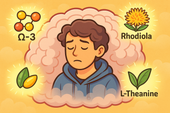
Brain Fog and Body Dysmorphic Disorder: Can Nootropic Supplements Help?
Brain fog often accompanies Body Dysmorphic Disorder, clouding focus and deepening emotional fatigue. Nootropic supplements like L-theanine, Rhodiola, and CoQ10 can help restore mental clarity, balance neurotransmitters, and bring calm energy back to the mind 🌿🧠.
-

How Stress Hormones Like Cortisol May Worsen Body Dysmorphic Disorder
Chronic stress floods the brain with cortisol — the hormone that keeps you on high alert. In Body Dysmorphic Disorder, this chemical overdrive fuels anxiety, distorts self-image, and traps the body in survival mode. Calming cortisol helps restore both peace and perspective 🌿🧠.
-

The Role of Neurotransmitters in BDD—and How Supplements May Help
Neurotransmitters like serotonin, dopamine, glutamate, and GABA shape how people with Body Dysmorphic Disorder perceive themselves. When these brain messengers fall out of balance, perception distorts — but targeted supplements can help restore calm, focus, and emotional regulation 🧠🌿.
-

What Is Body Dysmorphic Disorder? A Deeper Look at the Mind-Body Connection
Body Dysmorphic Disorder (BDD) isn’t just about appearance — it’s about perception. When brain chemistry, trauma, and stress distort self-image, the mind begins to see flaws that aren’t truly there. Healing starts by calming the nervous system and reconnecting mind and body 🪞🧠.
-

Keeping Calm in Competitive Sports: How to Train Your Mind, Body, and Chemistry for Peak Performance
Competitive pressure can overwhelm even the strongest athletes — but calm is trainable. By combining supplements like magnesium, L-theanine, and adaptogens with breathwork and mindset training, you can stay focused, balanced, and in control under any level of stress 🧠🏅.
-

Supplements for Parents Facing Toddler Tantrums: Staying Calm When Little Emotions Run Wild
Toddler tantrums can drain even the most loving parent — but your calm is powerful. With the right supplements like magnesium, L-theanine, and ashwagandha supporting your nervous system, you can stay patient, grounded, and kind, even when emotions run high 🧸🌿.
-

Workplace Stress and Anger Management Support
Workplace stress can quickly turn into frustration — but calm is a skill you can train. By combining supplements like magnesium, L-theanine, and adaptogens with breathwork and mindset tools, you can stay focused, patient, and emotionally grounded no matter how intense the office gets 💼🌿.
-

How to Stay Patient With Family During Stressful Holidays
Holiday gatherings can stir up old stress and test your patience — but calm is possible. With nervous system support from magnesium, L-theanine, and adaptogens, plus mindful breathing and clear boundaries, you can stay centered, kind, and grounded even when family chaos unfolds 🎄💞.
-

Supplements to Keep Calm During Traffic Jams
Getting stuck in traffic doesn’t have to ruin your mood. With calming supplements like magnesium, L-theanine, and ashwagandha, you can train your body to stay relaxed and focused behind the wheel — turning gridlock into a moment of grounded patience 🚗🌿.
-
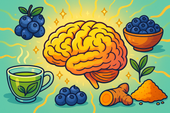
The Role of Antioxidants in Healing Brain Stress from Dissociation
Antioxidants protect the brain from the oxidative stress caused by trauma and dissociation. By neutralizing free radicals and supporting mitochondrial recovery, they help restore clarity, focus, and emotional balance — allowing the mind to heal at the cellular level 🌿🧠.
-
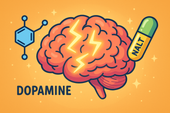
N-Acetyl L-Tyrosine (NALT) for Supporting Mental Clarity
N-Acetyl L-Tyrosine (NALT) fuels dopamine production — the neurotransmitter of focus and motivation. By supporting brain chemistry during stress, NALT helps restore mental clarity, energy, and alertness, making it easier to think clearly and feel present again ⚡🧠.
-

How Ginseng May Improve Focus and Energy in Dissociation
Ginseng helps combat the mental fatigue and fog that often come with dissociation. By supporting mitochondrial energy, balancing neurotransmitters, and regulating cortisol, it gently restores focus, motivation, and emotional presence — helping the mind reconnect with clarity and strength 🌿⚡.
-
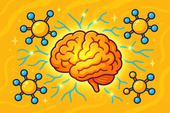
Phosphatidylserine and Dissociation: Supporting Cognitive Function
Phosphatidylserine helps calm the stress response by balancing cortisol, the body’s primary stress hormone. By lowering cortisol spikes, it protects memory, focus, and emotional stability — restoring clarity and mental presence for those struggling with dissociation 🧠🌿.
-
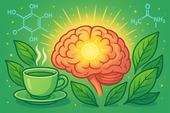
Can Green Tea Extract Help with Dissociative Brain Fog?
Green tea extract may help lift dissociative brain fog by supporting neurotransmitter balance, reducing inflammation, and enhancing energy at the cellular level. With its key compounds EGCG and L-theanine, it promotes calm focus, clarity, and emotional presence — helping you feel more alert and grounded 🍵🧠.
-
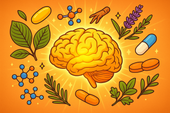
Building a Natural Supplement Stack for Dissociation Support
Building a supplement stack for dissociation means nourishing the brain and body back into communication. By supporting neurotransmitters, gut health, and energy balance through nutrients like magnesium, omega-3s, curcumin, and probiotics, you can help restore clarity, calm, and connection — one layer at a time 🌿🧠.
-

Chamomile and Lavender for Dissociative Anxiety Relief
Chamomile and lavender work together to calm dissociative anxiety by soothing the nervous system and restoring emotional safety. Their natural compounds balance cortisol, enhance GABA activity, and activate the vagus nerve — helping you feel grounded, connected, and at peace again 🌿💜.
-
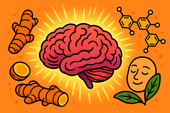
Curcumin for Inflammation and Mental Clarity in Dissociation
Curcumin, the golden compound in turmeric, does more than fight inflammation — it helps clear the mental fog often tied to dissociation. By calming neuroinflammation, balancing neurotransmitters, and supporting mitochondrial energy, curcumin can restore mental clarity, focus, and emotional presence 🌿🧠.
-
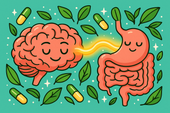
Probiotics and Dissociation: Exploring the Gut–Brain Axis
The gut–brain axis plays a vital role in emotional awareness and presence. When the microbiome is balanced, it supports serotonin production, vagus nerve activity, and calm focus. Probiotics help repair this connection — restoring safety, clarity, and the feeling of truly being in your body again 🌿🧠.
-
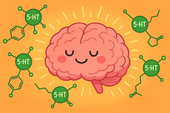
5-HTP for Dissociation: Supporting Serotonin and Emotional Stability
5-HTP helps bridge the gap between emotional numbness and stability by supporting serotonin production — the neurotransmitter that shapes mood, sleep, and sensory awareness. For people experiencing dissociation, 5-HTP may gently restore connection, presence, and emotional balance from the inside out 🌿🧠.

















































